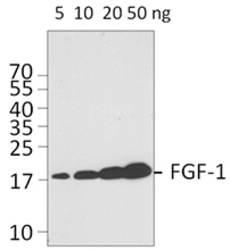678602
antibody from BioLegend
Targeting: FGF1
AFGF, ECGF, ECGF-beta, ECGFA, ECGFB, FGF-alpha, FGFA, GLIO703, HBGF1
Antibody data
- Antibody Data
- Antigen structure
- References [0]
- Comments [0]
- Validations
- Western blot [1]
Submit
Validation data
Reference
Comment
Report error
- Product number
- 678602 - Provider product page

- Provider
- BioLegend
- Proper citation
- BioLegend Cat#678602, RRID:AB_2565906
- Product name
- Purified anti-FGF-1-acidic
- Antibody type
- Monoclonal
- Antigen
- Parital human human FGF-1 recombinant protein (16-155 a.a.) expressed in E. coli.
- Description
- FGF-1, one of the most studied members of the fibroblast growth factor family, is a powerful mitogen exhibiting strong action on many different cell types. FGF-1 activity can be mediated not only by autocrine/paracrine pathways, but also by an intracrine pathway. FGF-1 lacks a secretion signal peptide and is exported through a non-classical pathway. Endogenous FGF-1 is found in the nucleus of most cell types. Nuclear localization is required for FGF-1 mitogenic activity. FGF-1 promotes tumor development by promoting cancer cell proliferation and survival. Increased FGF-1 expression in early stages of many different cancers have been reported. MCF-7 breast cancer cell lines that overexpress FGF-1 can form vascularized, metastatic tumors when injected into ovariectomized or tamoxifen-treated nude mice. FGF-1 also induces angiogenesis in vitro and in vivo. Thus, FGF-1 is an attractive candidate for cancer immunotargeting. FGF-1 is also involved in neuronal cell differentiation and survival. FGF-1 is highly expressed in motor neurons. In response to damage, motor neurons can release FGF-1, which results in astrocyte activation. Under oxidative stress, astrocytes can also release FGF-1, which stimulates ApoE/HDL generation in an autocrine manner for protection of the brain against oxidative stress. The involvement of FGF-1 in inflammation, cardioprotection, wound healing, adipocyte remodeling, and restenosis have also been reported.
- Reactivity
- Human
- Host
- Mouse
- Conjugate
- Unconjugated
- Antibody clone number
- 11A5C44
- Vial size
- 100 µg
- Concentration
- 0.5 mg/ml
- Storage
- 2°C-8°C
- Handling
- Ambient RT
No comments: Submit comment
Supportive validation
- Submitted by
- BioLegend (provider)
- Main image

- Experimental details
- 5, 10, 20, or 50 ng of human FGF-1 recombinant protein was resolved by electrophoresis, transferred to nitrocellulose, and probed with purified monoclonal anti-human FGF-1-acidic (clone 11A5C44) antibody. Proteins were visualized using a HRP conjugated anti-mouse-IgG secondary and chemiluminescence detection.
- Conjugate
- Unconjugated
 Explore
Explore Validate
Validate Learn
Learn Western blot
Western blot